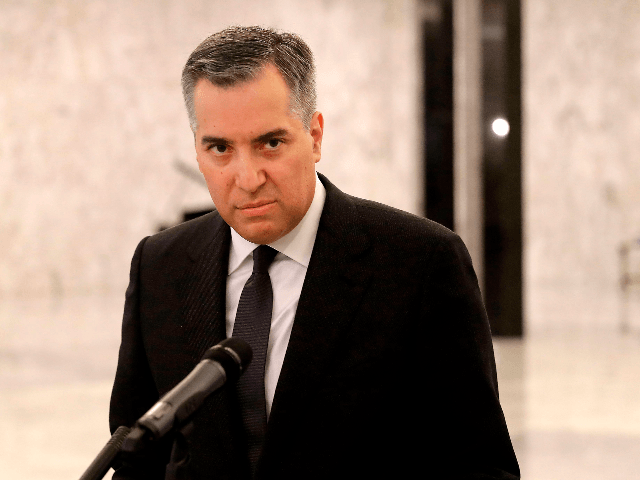Lebanese Ambassador to Germany Mustapha Adib, 48, was confirmed as the next prime minister of Lebanon in a parliamentary vote on Sunday.
Opposition groups immediately denounced him as a predictable choice by a political establishment they no longer trust at all.
Jumping from ambassador to prime minister might seem like an unlikely move, but Al-Monitor noted on Monday that Adib checked all the necessary boxes: he has executive experience as an aide to former Prime Minister Najib Mikati; he is a Sunni Muslim, a religious requirement for the prime minister’s office under Lebanon’s unique sectarian spoils system; he was endorsed by other former prime ministers, including the pivotal Sunni politician Saad Hariri; and he enjoys the support of the Iran-backed, Shiite Muslim Hezbollah terrorist organization, Lebanon’s most powerful political party.
Those are the very same resume points that make Adib less than exciting to Lebanese who distrust the corruption, incompetence, and terrorist influences of their government after years of economic collapse and political failure.
After the ultimate wake-up call arrived in the form of a gigantic explosion on August 4 that killed hundreds of people and inflicted billions of dollars in damage on a country that does not have billions of dollars to spare, Lebanese took to the streets to demand a total wipeout of their political elite and a fresh start with a brand-new government. Instead, they seem to be getting a solid establishment man with Hezbollah’s seal of approval.
The hard truth of Lebanese politics is that no other type of candidate could win enough parliamentary support from the complex network of small parties and factional interests that still runs the country, even after the Beirut blast.
This is especially true because forming a new government quickly was imperative, as Lebanon teeters on the brink of systemic collapse and outside benefactors, notably including France, expected a new government to be in power by the beginning of September. Adib was confirmed with 90 out of 128 votes in parliament hours before French President Emmanuel Macron arrived in Lebanon for a two-day visit.
As Al Jazeera News noted, the vote was largely ceremonial, since Adib’s appointment was “hashed out among the country’s sectarian leaders” beforehand, but for what it is worth, Adib won more votes than his immediate predecessor Hassan Diab, who resigned after the Beirut blast.
Like all of his recent predecessors, Adib took office promising to assemble a competent government quickly, deliver major reforms, make deals with foreign financial supporters, and avoid any further catastrophes.
“There is no time for talk, promises, and wishes. It is a time for action,” he said during his brief acceptance speech. His first official act was to tour the Beirut neighborhoods most heavily damaged by the August 4 explosion.
“It’s time for work to dovetail efforts and join hands, to restore hope among the Lebanese,” Adib said at a press conference on Monday. “By the grace of God Almighty, we hope we will be successful in selecting professionals with proven expertise and efficiency to implement the necessary financial and economic reforms.”
The problem, as Al Jazeera pointed out, is that the same sectarian leaders who settled Adib’s appointment before any votes were cast in parliament are also likely to scuttle any reforms that would loosen their grip on Lebanon’s financial sector or infrastructure, and such reforms will be demanded by foreign bodies like the International Monetary Fund (IMF) before any rescue packages can be approved.
“Most of the needed reforms will be politically and personally costly to the key political decision makers behind any government that emerges. Without a clear strategy for how Adib intends to address these challenges in the face of great political resistance, there is no reason to believe that Adib’s government will be any more successful than Diab’s,” financial adviser Mike Azar told Al Jazeera.
“It still remains a republic of billionaires, but it’s now run by their men, their advisers. It’s disturbing from a class aspect because they are reproducing the system and Adib is clearly coming to preserve the interests of those billionaires,” added a skeptical Rima Majed, assistant professor of sociology at the American University of Beirut and a protest organizer.
Macron gave an interview to Politico while en route to Lebanon in which he said he was making a “risky bet” with his political capital on the new government.
“It’s the last chance for this system,” he warned.
Macron rejected the idea of using his influence to force Hezbollah out of Lebanese politics, saying, “If we fight force with force, that’s called escalation. Don’t ask France to come wage war against a Lebanese political force … it would be absurd and crazy.”
Upon his arrival, Macron was greeted by a small crowd of protesters chanting, “Adib won’t do. We want Nawaf Salam.”
Salam is an International Court of Justice judge who has been the favored prime minister candidate of reformers for some time, but as Macron pointed out, he would never be able to win the office because he is unacceptable to Hezbollah. Macron also insisted he had nothing to do with the choice of Adib, saying “it’s not my job to interfere or approve.”

COMMENTS
Please let us know if you're having issues with commenting.